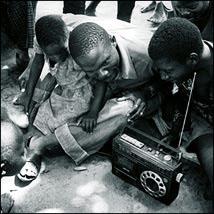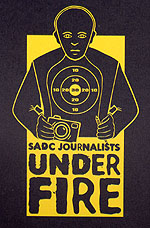|
|
 |
Programme Media and Freedom of Expression “Never before has a severe famine taken hold in a country that has a relatively free press. Media can be a nuisance and an irritation when they twist information, they can even destroy lives, but freedom of the press can ultimately enrich the human life, create justice and stimulate economic and social development,” writes Nobel Prize winner and economist Amartya Sen (Media Freedom magazine, May 2004).
NiZA promotes the process of democratisation in Southern Africa by supporting media and by exchanging ideas and experiences on freedom of the press. NiZA has set media as one of its main priorities, Based on the conviction that the press plays a pivotal role in social and political change.
 | | Listening to the election results, Mozambique 1994 |
Alert, independent and pluralistic media act as watchdogs to ensure that governments act in the interests of their people. Politicians risk negative publicity in the media, potentially suffering political defeat as a result, if they do not take the needs and interests of the population into account.
Media also give private citizens access to the information they need to form an opinion and to express it. This makes it possible to citizens to make informed decisions and make their contribution toward building their society.
Southern Africa experienced a period of major political and social upheaval in the decade following the fall of apartheid. Independent media now have to stand ready to act as watchdogs and contribute to society’s development. Although very positive developments can be reported in the area of media – such as the huge increase in the quantities of private printed and electronic media – freedom of the press and freedom of expression continue to be fragile achievements. Various countries in Southern Africa have no such freedoms at all. Although the intentions may have been set out in the constitution, their effects often do not yet extend to actual daily practice.
 | | SADC journalists under fire |
Freedom of the press is still inhibited by governments that work to prevent the development of independent media. Arrests, physical attacks and direct censorship still have a major impact on how and what journalists report. Many countries have laws that restrict the constitutional guarantees of freedom of the press and freedom of opinion. Self-censorship as a result of repression can also clearly be seen in how some journalists think.
Due to the high percentage of illiteracy and the widespread poverty in Southern Africa, the average private citizen in essence has only limited access to independent media. Many people cannot permit themselves the luxury of a newspaper, and the distribution of printed media outside the capital cities is extremely limited due to the exorbitantly high prices of printed materials and the poor infrastructure. Although the number of radio stations run by private organisations and communities has seen enormous growth, the state broadcasting company still holds a monopoly on the national radio broadcasting rights. We see similar patterns in the surrounding countries, often even worse.
| |
|
|

|
 |  |  |  |
|

